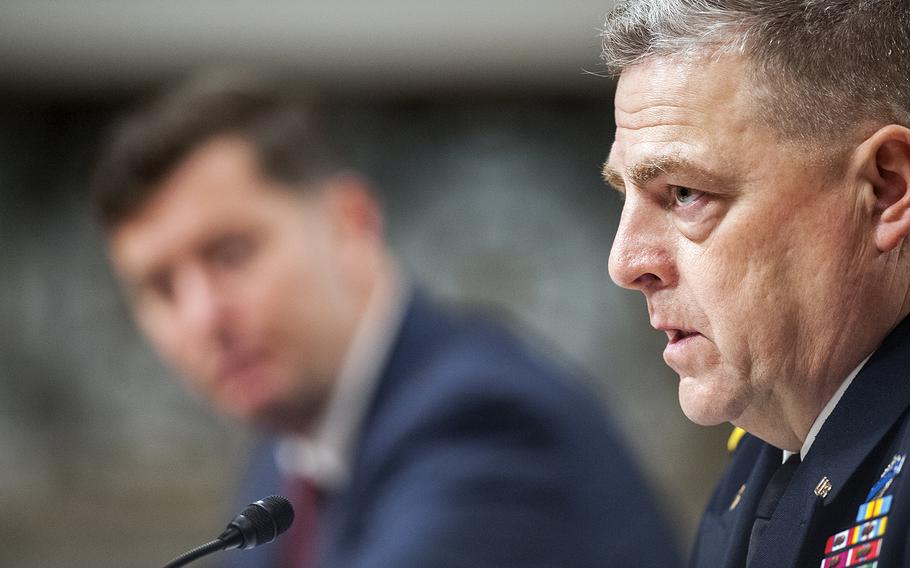
Chief of Staff of the Army Gen. Mark Milley and Acting Secretary of the Army Patrick Murphy testify before the Senate Committee on Armed Services on Capitol Hill in Washington, D.C. on Thursday, April 7, 2016. (Carlos Bongioanni/Stars and Stripes)
WASHINGTON — The Army chief of staff said Thursday that an effort in Congress to reverse deep troop cuts will be a national “disaster” without increases in the service’s budget, a prospect that remains remote among divided lawmakers.
Gen. Mark Milley, in testimony to the Senate, said installations would be closed, soldier quality-of-life programs ended and modernization programs curbed if the service was forced to keep the tens of thousands of troops set to be culled over the next few years.
The Army unveiled plans last summer to reduce active-duty soldiers from 490,000 to 450,000 due to tight budgets imposed by Congress. But the plan is widely unpopular among Republican defense hawks on Capitol Hill and an effort is building to mandate a higher troop number.
However, Republicans brokered a two-year deal with Democrats last fall that locks in spending amounts for two years. It is unclear whether lawmakers could give more money to the Army to keep the troops without breaking the agreement and sending the federal budget into disarray.
“If we were mandated to go to a higher size, more soldiers, more bigger end strength, and we didn’t have the dollars, I personally think that would be disaster for both the nation and the Army,” Milley told the Senate Armed Services Committee. “At the end of the day, I think we would literally risk having a hollow Army.”
The general compared the potential fallout to the days after the Vietnam War, when many believe the service hit a low point due to shrinking funding and neglect.
“We do not have a hollow Army today but many on the committee remember the days when we did, when people didn’t train and units weren’t filled up with appropriate levels of end strength. There were no parts off the shelf,” he said. “All of those things would start happening if we increased the size of the force without the appropriate amount of money to maintain its readiness.”
Sen. John McCain, R-Ariz., and other members of the Armed Services Committee called for reversing the cuts in early February, saying the “budget-driven” reductions are contrary to an increasingly dangerous world. Members of the House Armed Services Committee announced plans to create legislation blocking the Army cuts at the same time.
Republicans are eyeing an overseas war fund — a pot of money exempt from spending caps — as a way to pump more money into the military, despite the agreement with Democrats in November.
A final proposed troop number and cost has not been determined. In 2016 and 2017, the Army plans to cut 10,000 soldiers from the active-duty ranks, bringing the force to 460,000 soldiers. The Army National Guard would be cut by 7,000 and the Army Reserve by 3,000.
Overall, the troop cuts will save about $7 billion in four years, according to Army projections.
Sen. Tom Cotton, R-Ark., a member of the Armed Services Committee, said he wants a “much higher” troop number but acknowledged the need for more funding to accompany it.
“While I certainly support a much higher end strength than we are on a path to have, I also think it is deeply inadvisable to not to match that with a concomitant budget increase,” Cotton said.
tritten.travis@stripes.com Twitter: @Travis_Tritten